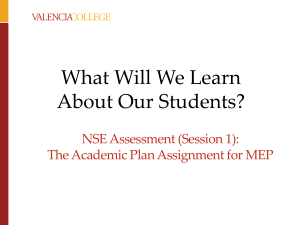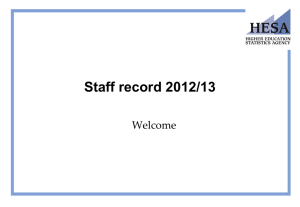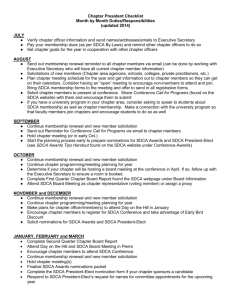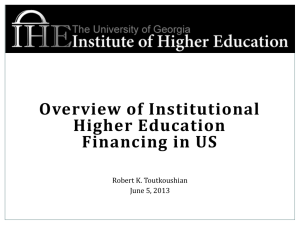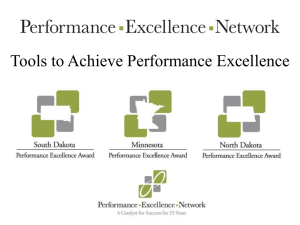External Quality Assurance System
advertisement
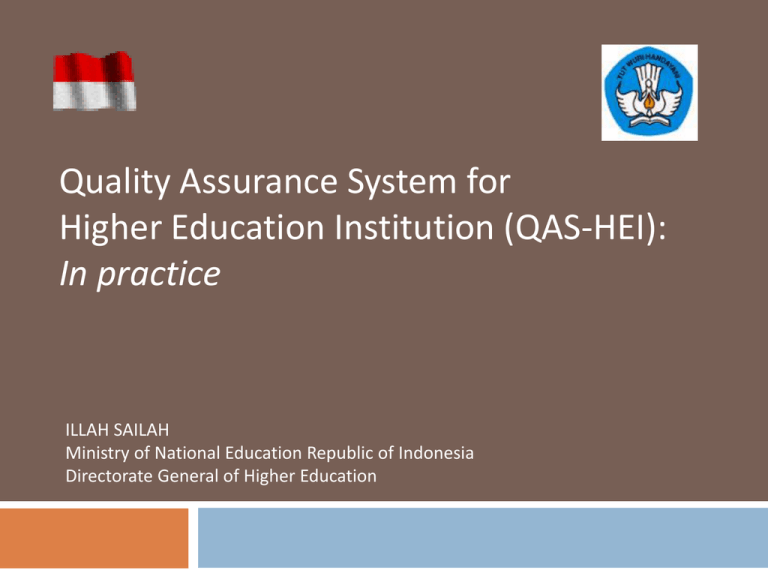
Quality Assurance System for Higher Education Institution (QAS-HEI): In practice ILLAH SAILAH Ministry of National Education Republic of Indonesia Directorate General of Higher Education LEGAL BASIS OF QUALITY ASSURANCE The Law Number 20 of 2003 : National Education System (article 1, 35, 50,52, 60) 2 The Governmental Regulation Number 19 of 2005, article 2 : National Education Standard The scope of standard covers: 1. Contents √ 2. Processes √ 3. Graduate competence √ 4. Educators and educational staff √ 5. Facilities and infrastructure √ 6. Management 7. Funding 8. Learning assesment √ National Policy of QAS-HEI (2) Government Regulation Nr.19/2005 as to National Standard of Education (NSE) Article 4: The NSE aims at assuring the quality of national education in the framework of sharpening the intellect of the people and of forming their character, as well as shaping the civilization of a dignified nation. Article 91: (1) Any formal and nonformal education institution must conduct quality assurance of education. (2) Quality assurance of education aims to fulfill or exceed National Standard of Education (NSE). National Policy of QAS-HEI (3) HELTS 2003 -2010 Point E Strategic Issues: In healthy organization, a continuous quality improvement should become its primary concern. Quality assurance should be internally driven, institutionalized within each organization’s standard procedure, and could also involve external parties. However, since quality is also a concern of all stakeholders, quality improvement should aim at producing quality outputs and outcomes as part of public accountability. Vision and Mission (strategic planning 2010-2014) Vision: Smart and Comprehensive Intelligence Mission: 1.Availability 2.Affordability 3.Quality 4.Equity 5.Assurance NSE - HEI Standards Based on GR.Nr.19/2005 of National Education HEI Standards Exceed NSE 8 NSE Minimum Standards Internally driven Mandatory QAS-HEI Existing Condition Higher Education Institution Self Assess ment Evaluation of Study Program Based on Self Assessment ESP BSA Internal Quality Assurance IQA External Quality Assurance EQA Indonesian QAS-HEI (1) Quality Assurance System Internal Quality Assurence System (IQAS) NSE External Quality Assurance System (EQAS) NSE NSE Higher Education Institution Data Base NSE (HEI-DB) Launched on 3 dec 2010 Indonesian QAS-HEI (2) HEI-Data Base National activities systemizes the collecting, processing, and saving of data, as well as information dealing with the management of HE at all of its institutions by the DGHE in order to supervise the management by the government, as instructed in Article 66 (1) and (2) of the Law of National Education System (NES); Internal QAS The systemic activities involving quality assurance of higher education at HEI by the institutions themselves (internally driven) are conducted to supervise HE management by the institutions themselves (in the shape of continuous improvement) as regulated by Article 50 (6) of the Law of NES and Article 91 of GR.No. 19/2005 as to NSE; Indonesian QAS-HEI (3) External QAS The systemic activities involving the evaluation of suitability of programs and/or HEI by NAB-HEI or autonomous institutions outside of HEI that have been recognized by the government, to supervise HE management on behalf of public accountability as instructed in Article 60 (2) of the Law of NES and Article 86 (3) of GR.No. 19/2005 as to NSE (accreditation) Indonesian QAS-HEI (4) Goals and Objectives 1. Goals The purpose of QAS-HEI is to supervise the National HEI-DB, IQAS and EQAS to fulfill or even exceed the NSE by HEI to stimulate the effort to attain continuous quality assurance of HEI. 2. Objectives QAS-HEI has the following objectives: a. Creating synergy between the National HEI-DB, IQAS and EQAS; b. The National HEI-DB, IQAS and EQAS are to employ NSE as their exclusive or same standard. Indonesian QAS-HEI (5) Status and Mechanisms 1. Status HEI-DB is intended to meet the requirements, as laid down in Article 50 of the Law of NES, which regulates that the management or co-ordination of the NES is the responsibility of the MONE. Therefore, this subsystem is developed to perform the tasks and to exercise the authority of the government to supervise HE management through achieving the NSE. IQAS is intended to fulfill or even exceed the NSE (continuous improvement) as an effort to meet the needs of internal stakeholders (especially students, educators and educational staff). EQAS is based on the NSE or a standard exceeding this (as actually determined by HEI) and intended to specifically fulfill the needs of external stakeholders (parents, world of work, general public, and government). Indonesian QAS-HEI (6) 2. Mechanisms The mechanism of QAS- HEI consists of the following steps: a. The data and information dealing with each of the activities at HEI must be collected, processed and saved by the institutions concerned, in their own HEI-DB, with the classification of the data and information based on the NSE. These items must subsequently be forwarded, collected and saved or stored by the National HEI-DB managed by the DGHE. The data and information concerning HEI consist of: • Data and information dealing with the attainment of the NSE covering 8 minimum standards; • Data and information dealing with activities at HEI that exceed the NSE, both in terms of quality and quantity exceeding 8 minimum standards, in accordance with vision of the HEI concerned. Indonesian QAS-HEI (7) b. By making use of the data and information collected and stored in their respective HEI DB, HEI implement IQAS by way of self-evaluation at two levels, namely: • Self-assessment concerning the attainment of the NSE consisting of 8 minimum standards both in terms of quantity and of quality; • Self-assessment concerning the degree to which the HEI concerned have exceeded the 8 minimum standards, both in terms of quantity and quality; c. By making use of the data an information collected in the National HEIDB, the NAB-HEI or autonomous institutions officially recognized by the government deal with accreditation called EQAS, with the stipulation that if the respective HEI do not achieve the 8 minimum standards, the HEI in question will be labeled “unaccredited”. Indonesian QAS-HEI (8) Institutional Affairs Institutions that are responsible for performing their duties and tasks, showing their competence and assume responsibility in each of their respective subsystems as follows: • The DGHE is responsible for the management of the National HEI-DB; • Each HEI is responsible for the management of their respective HEI-DB and the implementation of IQAS; • The NAB-HEI (BAN-PT) or autonomous institutions officially recognized by the government are responsible for the implementation of EQAS. Internal QAS - HEI QC management in Internal QAS-HEI PDCA (Plan, Do, Check, Action) which will provide kaizen or continuous improvement in HEI SDCA Quality first Stakeholder - in The next process is our stakeholder Speak with data PDCA SDCA PDCA SDCA PDCA SDCA PDCA SDCA S : Standard Upstream management Distribution of HE Institutions in Indonesia 3016 HEIs 15364 study program 331 244 166 91 206 334 329 248 320 481 123 130 9 PhD Master Specialist Profession 8 7 6 Bachelor D IV D III 5 D II 4 3 General High School ACADEMIC 2 1 PROFESSION DI Vocation High School VOCATION What does DGHE do? Activities Formulation of the guidance book Socialization Dissemination Training of the trainers Survey Empower University to implement QAS Results 2008-2009: there are 126 universities which applied excellent management Accreditation Criterion mostly fulfilled by Universities, 2/3 of total of study program What does DGHE do? 2010 Sozialization attended by 1486 HEIs In 17 regions Intensive Technical Assistance to 126 HEIs The best Practices HEIs: year 2008 2009 2010 Number HEIs which Number Filling Questionaires of HEIs which visited by reviewer 353 464 350 127 120 64 Number of HEIs catogarized as Best Practices in QA 68 58 50 QA IN PRACTICE UNIVERSITAS AIRLANGGA MWA REKTOR WAKIL REKTOR I, II, III SENAT AKADEMIK DEWAN AUDIT SEKRETARIAT UNIVERSITAS SPI PPP PPKK PLK PPMB BPF BPP PPM DIR. KEU DIR. SD FAKULTA S FAKULTAS PPS PERPUSTAKAAN DEPARTEMEN DOSEN 22 DIR. SI Pusat Penjaminan Mutu Universitas Airlangga DIR. MAWA LPPM DIR. DIK LP3 LPT Brawijaya University Senat Universitas Dewan Pengawas REKTOR PR-I PR-II PR-III Unsur Pimpinan/Pemimpin BLU PJM SPI Unsur Pemantau dan Evaluasi BAU BAAK BAPSI BAK Biro Unsur Pelaksana Administrasi Pusat Bisnis Unsur Usaha Bisnis Unit Pemb. Agama Unit Pel. Kesehatan Unit Lain Per pus LSIH Unit TIK Unit InBis FE FIA FP FT FPt FK FPIK Unit Pener bitan Unit JPC Unit Lain Unsur Penunjang Akademik Unsur Penunjang Non Akademik FH Unit Pusat Bahasa LMKU FMIPA FTP FISIP FIB PKH Fakultas / Program setara Fakultas Unsur Pelaksana Akademik Program Pend. Vokasi Program Pasca sarjana LPPM LP3 Lembaga Program 23 QA MECHANISM IN UNPAR 24 Decision of the foundation to set up: Team Establishment Core team implementator System team of QA Policy on QA.: 1. Vision and Mission 2. Accrediatation Results 3. Stakeholders need MODEL OF QA: P D C A – Plan, Do, Check, Action WITH CONTINUOUS IMPROVEMENT PDCA implementation 25 SDCA P D C A P D C SDCA A P D C SDCA A S = Standard SDCA Definition on QAS in UNPAR 26 QAS Unpar : System of determinating, implementing, controlling, developing the quality stándar of UNPAR Comprehensive, sustainable Match with the basic values, vision, mission, objectives, goals of UNPAR Formulated with all stakeholders Structure of QAS in Unpar 27 Unpar 17 components QASUnpar 17 Standards 136 Subcomponents 136 Derivatives of Standars 17 Standards of QAS in Unpar National Standard UNPAR’s QAS - A. Identity 1. Content B. Content 4. Lecturers C. Lecutrers Supporting Staff D. Supporting Staff 2. Process E. Students F. Learning Process 8. Education Evaluation G. Education Evaluation 3. Competencies H. Competencies 28 17 Standards in UNPAR’s QAS - I. Reseachs 5. Facilities 7. Funding J. Publications K. Community Services L. Facilities M. Funding - N. Welfare O. Collaborations P. ICT system 6. Governance Q. Governance 29 136 Derivatives Standards A.Identity [ 7 ] J. Publications [ 5 ] B. Contents [ 10 ] K.Community Services [ 5 ] C. Educators[ 9 ] L. Facilities[ 18 ] D. Supporting Staff[ 9 ] M. Funding [ 8 ] E. Students [ 8 ] N. Welfare [ 5 ] F. Learning Process[ 9 ] O. Collaboration [ 7 ] G. Evaluations[ 4 ] P. ICT System[ 7 ] H. Competencies[ 7 ] Q. Governance [ 11 ] I. Researchs[ 7 ] 30 UNPAR Strategies on QAS 31 Commitment of Foundation and University Information and data warehouse establishment Derivate and develop standards Auditing (internal and external) execution Continuous Benchmarking The 5 Principals of Implementation a. b. c. d. e. Quality first; Stakeholders-in; The next process is our stakeholders; Speak with data; Participative management. 32 evaritospoli Vielen dank Thank you and see you

